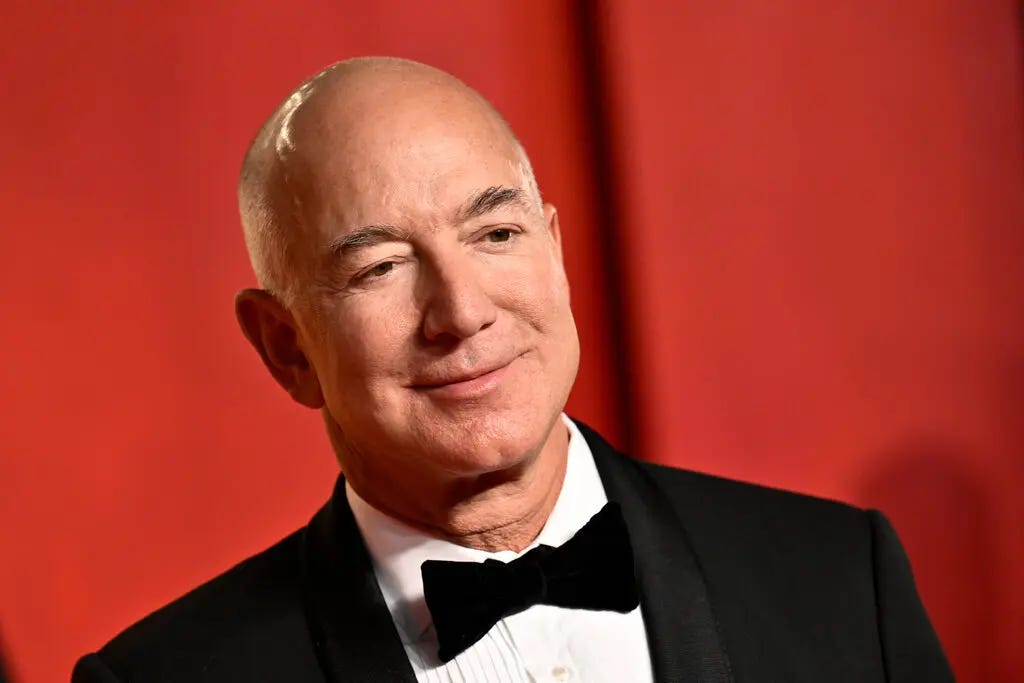Bezos Pushes Back on Angry Narrative
A thorough look at Jeff Bezos' explanation and answer to critics of his decision for the Washington Post not to endorse a candidate - Kamala Harris - for President.

Billionaire entrepreneur Jeff Bezos, the founder of Amazon and owner of the Washington Post, knows when change and improvements are necessary to succeed. He recognizes the importance of trust and credibility and knows risk when he sees it.
That’s what he has noticed in legacy media and why he says he decided The Post would break tradition, damn the criticism and not endorse a candidate for the 2024 Presidential election.
It infuriated many staff, former employees, subscribers (reportedly 250,000 canceled the paper) and Kamala Harris supporters because Harris was the one who was going to be endorsed in her campaign versus former President Donald Trump.
Bezos knows change isn’t an option. It’s necessary and an emergency to address.
He wrote an opinion piece in The Post about it, which was entitled The hard truth: Americans don’t trust the news media, A note from our owner.
He pointed to the research and ugly truth that played a role in his decision making.
“In the annual public surveys about trust and reputation, journalists and the media have regularly fallen near the very bottom, often just above Congress,” Bezos wrote. “But in this year’s Gallup poll, we have managed to fall below Congress. Our profession is now the least trusted of all. Something we are doing is clearly not working.”

He’s willing to accept the facts, be truthful and humble instead of dismissive or defensive as heads of many media outlets executives have shown. Stakeholders don’t always receive honesty well. In essence, Bezos is saying, yes, the Gallup poll “whistleblower” findings are factual and alarming and will be ethically addressed.
“Let me give an analogy,” Bezos explained. “Voting machines must meet two requirements. They must count the vote accurately, and people must believe they count the vote accurately. The second requirement is distinct from — and just as important as the first.
“Likewise with newspapers. We must be accurate, and we must be believed to be accurate. It’s a bitter pill to swallow, but we are failing on the second requirement.”
Many journalists, editors and publishers vehemently, publicly disagree or privately seethe. Does it make the research findings less true?
“The truth does not change according to our ability to stomach it emotionally,” is a quote attributed to late writer Flannery O’Connor. Did she have a point that still stands? Bezos doesn’t say it yet his words infer it.
He has been facing and enduring the nastiest of backlash.
Critics say Bezos lacks courage and acted as he did because wanted Trump to win. Yet it is worth asking if that theory of strong belief holds weight and makes sense when you consider how important success and Bezos’ business reputation is to him.
Success is part of his identity. He doesn’t like to fail. It’s legitimately arguable that Bezos is primarily focused on his reputation and business, which means he has to care about his newspaper being believable, trusted and successful.
Critics point to the 250,000 lost subscribers. Bezos is confident that he will recoup financial value by focusing first and foremost on building credibility and trust that he knows is running, if not on empty, then on low supply.
Bezos sees the evidence that people inside and outside his organization — and the media industry — are denying.
“Most people believe the media is biased,” he wrote. “Anyone who doesn’t see this is paying scant attention to reality and those who fight reality, lose.
“Reality is an undefeated champion.”
Bezos understands that change is painful and emotions help fuel resistance to it.
“It would be easy to blame others for our long and continuing fall in credibility (and, therefore, decline in impact), but a victim mentality will not help,” Bezos communicated in straight-talk fashion.
“Complaining is not a strategy,” he wrote, pointing the way forward. “We must work harder to control what we can control to increase our credibility.”
Bezos is not convinced that what his journalists believed and demanded to publish.
“Presidential endorsements do nothing to tip the scales of an election,” he argued. “No undecided voters in Pennsylvania are going to say, ‘I’m going with Newspaper A’s endorsement.’ None. What presidential endorsements actually do is create a perception of bias. A perception of non-independence.”
Journalists, editors and former editors at the Post and other media outlets will call this nonsense and quite likely be offended. Trump was viewed to them as a clear and present danger and undeniable threat to the nation (“democracy”), its citizens and the world. It was critical in their minds to continue the status quo and endorse someone else — in this case, Harris — for President of the United States.
Bezos saw a deeper problem. Perception of bias and favoring one candidate was going to severely cost trust with people outside of those who already were voting for her. Endorsements in the election had no place he concluded because influential media like The Post is supposed to be about objectivity and operating without bias.
“Ending them is a principled decision, and it’s the right one,” he wrote, pointing to another person in history who felt similarly. “Eugene Meyer, publisher of The Washington Post from 1933 to 1946, thought the same, and he was right.”
Bezos admitted that decision alone will not correct years of eroding trust.
“By itself, declining to endorse presidential candidates is not enough to move us very far up the trust scale, but it’s a meaningful step in the right direction,” he wrote.
Time will most likely prove him correct and courageous yet for now, the decision has come at a high cost and won’t come without further false assumptions, financial xoara and pain of criticism.
His figurative bet could become a win and if so, history will richly reward him.

Bezos has admitted regrets with his decision.
“I wish we had made the change earlier than we did, in a moment further from the election and the emotions around it. That was inadequate planning, and not some intentional strategy,” he came to realize.
He and the newspaper could have possibly suffered less criticism if the decision was made months earlier, although that is not a definite.
“I would also like to be clear that no quid pro quo of any kind is at work here,” Bezos contended. “Neither campaign nor candidate was consulted or informed at any level or in any way about this decision. It was made entirely internally.”
He knows that what is known is not a good look.
“Dave Limp, the chief executive of one of my companies, Blue Origin, met with former president Donald Trump on the day of our announcement,” Bezos wrote.
“I sighed when I found out, because I knew it would provide ammunition to those who would like to frame this as anything other than a principled decision.
“But the fact is, I didn’t know about the meeting beforehand. Even Limp didn’t know about it in advance; the meeting was scheduled quickly that morning. There is no connection between it and our decision on presidential endorsements, and any suggestion otherwise is false.”
Truth bomb: Perception, mixed with heated emotion, becomes reality in a conflict.
“When it comes to the appearance of conflict, I am not an ideal owner of The Post,” Bezos wrote, going on to detail why.
“Every day, somewhere, some Amazon executive or Blue Origin executive or someone from the other philanthropies and companies I own or invest in is meeting with government officials. I once wrote that The Post is a ‘complexifier’ for me,” he wrote. “It is, but it turns out I’m also a complexifier for The Post.”
He knows what people have thought about him and will certainly continue to think and amplify to others they know and out into the world.
“You can see my wealth and business interests as a bulwark against intimidation, or you can see them as a web of conflicting interests,” he stated. “
Only my own principles can tip the balance from one to the other. I assure you that my views here are, in fact, principled, and I believe my track record as owner of The Post since 2013 backs this up.”

He knows he won’t be able to convince people who don’t want to be convinced.
“You are of course free to make your own determination, but I challenge you to find one instance in those 11 years where I have prevailed upon anyone at The Post in favor of my own interests,” Bezos argued. “It hasn’t happened.”
Defensiveness usually further drives anger and confirmation bias, which is unhelpful in conflict or crisis. It’s clear that Bezos feels that the disappointment, criticism, anger and rage is unjustified and requires explanation.
He would have benefitted from not communicating this defense yet Bezos felt it necessary to convey the facts and truth and funnel it into the public discourse.
He’s willing to anger others in the industry to, as some people like to say, “say the quiet part out loud.”
“Lack of credibility isn’t unique to The Post,” Bezos acknowledged. “Our brethren newspapers have the same issue. And it’s a problem not only for media, but also for the nation.”
The reality has led to actions that are not positive for legacy media.
“Many people are turning to off-the-cuff podcasts, inaccurate social media posts and other unverified news sources, which can quickly spread misinformation and deepen divisions,” Bezos pointed out.
“The Washington Post and the New York Times win prizes, but increasingly we talk only to a certain elite. More and more, we talk to ourselves.”
Bezos knows that is bad for business, bad for news and a failure to drive a better informed readership and smarter national conversations. He additionally realizes that it has to change, no matter the uproar.
Again, he focuses on the business in addition to the trust once held.
The current decline in trust is not longstanding. “It wasn’t always this way — in the 1990s we achieved 80 percent household penetration in the D.C. metro area,” Bezos laments.
Bezos, like it or not, has drawn a line in the sand. He is willing to take the figurative arrows for what he feels is critically necessary: ethically, news wise and business wise.
“While I do not and will not push my personal interest, I will also not allow this paper to stay on autopilot and fade into irrelevance — overtaken by unresearched podcasts and social media barbs — not without a fight,” he wrote.
“It’s too important. The stakes are too high.”
Bezos is displaying leadership and leaders are not always liked but they do what they know must happen. He may be very well be seeing what other owners, publishers and journalists are not wanting to see, believe and acknowledge.
“Now, more than ever, the world needs a credible, trusted, independent voice, and where better for that voice to originate than the capital city of the most important country in the world?” Bezos proposed.
“To win this fight, we will have to exercise new muscles.”
Exercising those new muscles, he knows, is initially painful yet that pain subsides and passes. He knows it will too with change towards more objectivity and securing a higher level of credibility and trust.
“Some changes will be a return to the past, and some will be new inventions,” Bezos explained.
He knows, of course, what’s coming.
“Criticism will be part and parcel of anything new, of course. This is the way of the world,” he wrote. “None of this will be easy, but it will be worth it.”
Pain. It will be worth it. Bezos is taking a big swing, against the grain, for a return to media being less distrusted, more respected. It will lead to a return to prominence.
“I am so grateful to be part of this endeavor,” he wrote of his responsibility.
“Many of the finest journalists you’ll find anywhere work at The Washington Post, and they work painstakingly every day to get to the truth. They deserve to be believed.”
He understands the mission — what must become the new norm — for the journalists and publications that expect and want to be believed.
Bezos is leading in that direction.
Michael Toebe is a specialist for trust, risk, relationship, communications and reputation at Reputation Intelligence - Reputation Quality. He serves individuals and organizations by helping them further build, protect, restore and reconstruct reputation.
Subscribe for free or become a paid subscriber for extra benefits.
Follow Reputation Intelligence on Twitter/ “X”
Follow Reputation Intelligence on the Medium platform for more stories/insights







